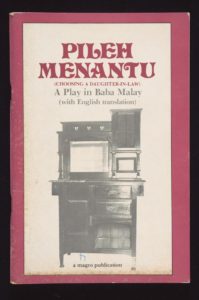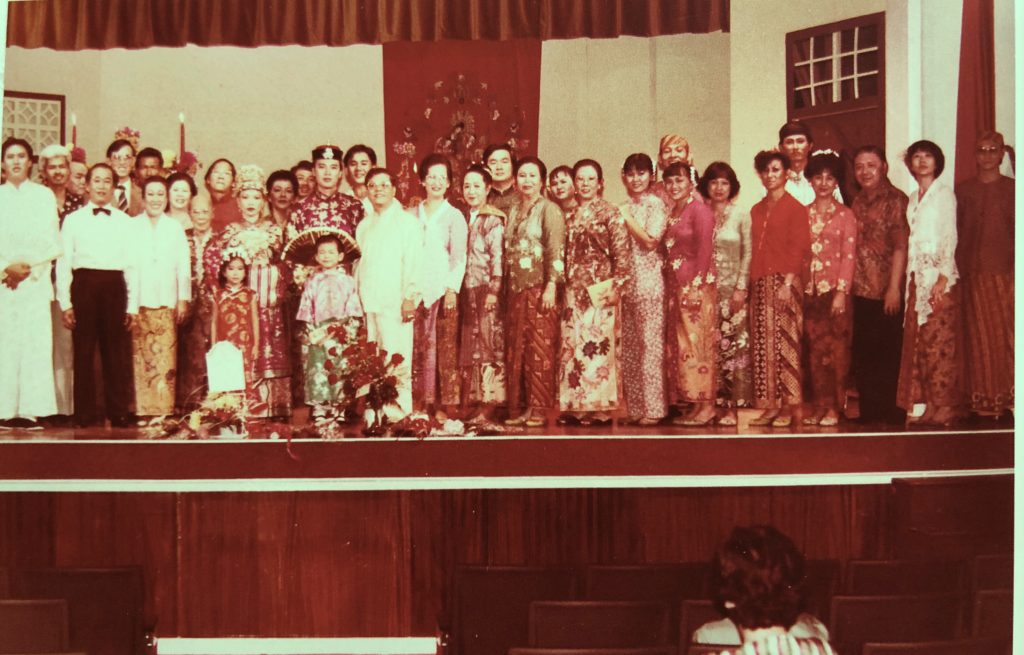NYONYA CYNTHIA WEE-HOEFER REMINISCES WITH NYONYA CECILIA ONG ABOUT THE PLAY THAT LAUNCHED BABA GT LYE’S WAYANG PERANAKAN CAREER
Photos courtesy of Baba Peter Wee.
For more than 20 years since the 1960s, there was a lull in the Peranakan theatre scene. No new plays were written or staged until 1984, when Pileh Menantu (Choosing a Daughter-in-Law) revived wayang Peranakan. Unlike the Baba plays of the 1950s, the cast comprised of both men and women.
My friend, Nyonya Cecilia Ong, directed the play. Now in her early 70’s, Cecilia was then working as a producer in Radio and Television Singapore, having recently returned from her studies at Central School of Speech and Drama.
Pileh Menantu was commissioned for the Singapore Arts Festival. Cecilia recalls, “Baba Robert Yeo, who was on the festival’s sub-committee, asked Baba Felix Chia to write a play for a universal audience, not just for Peranakans. Previously, Baba plays were the domain of the Gunong Sayang Association (GSA).”
Cecilia says that directing the play was challenging. “I felt like I was treading on eggshells. I wanted to move away from the typical melodrama of previous Baba plays and present the script in a modern setting, yet ensure the correct delivery of Baba Malay,” she shared. “Playwright Baba Felix Chia attended some rehearsals and gave a few tips, but did not do more,” said Cecilia.
Back then, there were hardly any professional theatre actors in Singapore, so she placed an advertisement in the newspapers to look for the cast.
Little did she know that among the amateurs she auditioned, one would eventually become a legendary wayang Peranakan star. A gentleman by the name of Henry won the role of the father. It was his first foray into theatre and Pileh Menantu launched his stage career.
Cecilia had a hard time casting the matriarch. Her search led her to the Kampong Kapor Church where she had spotted Mrs Mah Beng Guan. Cecilia was bowled over by Mrs Mah’s vivacious personality. The octogenerian gamely agreed to play the role even though she had no acting experience.
To keep up with the exacting standards of Peranakan culture, Cecilia asked wayang Peranakan star, the late Baba William Tan, “to help with the enunciation, the tone and emotion that is proper to the characters”. “The songs and pantons were written by William and his musicial team from GSA,” she remembers.
The late Baba Peter Wee, who owned Katong Antique House, provided elaborate props, including an antique tok sam kai (altar table), and paraphernalia for the wedding scene. The authentic wedding pageant in the play was conducted under the supervision of a real-life, elderly sangkek um (mistress of ceremonies in a Peranakan wedding) from Melaka.
A seroni (Chinese clarinet) player was brought in from Melaka. In a last minute panic, Cecilia roped in her young son to play the pageboy in the wedding procession. Luckily, he could fit into the costume!
Pileh Menantu had a successful five-day run of sold-out performances at the Drama Centre, which was then at Fort Canning Park.
“When I directed Pileh Menantu, I found that I had to rely on three essential skills which are not taught in drama school: resourcefulness, patience, and diplomacy! There was great camaraderie between the cast and crew. We had fun!” says Cecilia.
Pileh Menantu marked the beginning of a renaissance for Peranakan theatre. The novice actor who played the role of the father went on to become a doyen of Peranakan theatre, GT Lye.
“I would dare say that this play not only revived wayang Peranakan, but also renewed interest in Peranakan culture. There was excitement within the Peranakan community over the play, and it brought our culture into the mainstream. This led to new Peranakan plays being written and performed, and even Peranakan wedding processions staged to showcase the culture,” says Cecilia.

